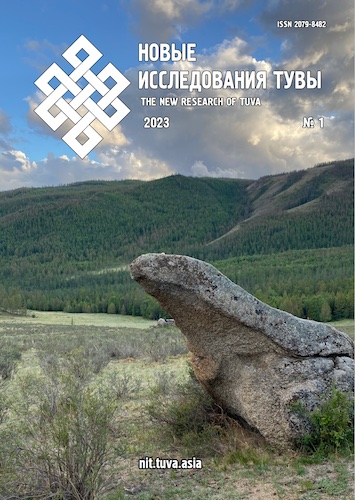Cher ‘earth’ in Tuvan paroemias
DOI:
https://doi.org/10.25178/nit.2023.1.2Keywords:
Tuvan language; Tuvans; oral folk arts; proverb; saying; lexico-semantic group; vocabulary; earth; Motherland; native landAbstract
The article examines a concept of the Tuvan culture — ‘чер’ (‘earth’). The researcher analyzes its meanings and aspects using proverbs and sayings from different collections. Unlike other linguoculturologists who are focused on studying the concept ‘native land, Motherland’ (‘төрээн чер, төрээн чурт’ in Tuvan), the author discusses a broader concept. The work was carried out within the framework of the study of the main concepts that make up the thesaurus of Tuvan culture.
In particular, it is noted that there is a difference between the meanings of the terms ‘чер’ and ‘чурт’, which is almost not discussed by philologists.
One of the facets of the concept ‘чер’ is the aspect of the proximity of the earth to man, the kinship between them: the earth is the mother, it is the native land. In another aspect, the beliefs about the earth formulated in proverbs also contain an understanding of its fertility. Since the land was of great importance to the Tuvans, its qualities and characteristics were constantly compared with what people do or what they are.
References
Bardamova, E. A. (2021) Reprezentatsiia prostranstvennykh predstavlenii v buriatskom iazyke [Representation of spatial representations in the Buryat language]. 2nd ed., revised and enlarged. Ulan-Ude, Buryat State University Publishing Department. 176 p. (In Russ.). DOI: https://doi.org/10.18101/978-5-9793-1610-9-2021-1-176
Bolat-ool, R. V. and Pelevina, N. N. (2017) Formirovanie obraza zhenshchiny v tuvinskikh i nemetskikh poslovitsakh [On woman's image in Tuvan and German proverbs]. Vestnik Khakasskogo gosudarstvennogo universiteta im. N. F. Katanova, no. 21, pp. 29–32. (In Russ.).
Bredis, M. A. and Ivanov, E. E. (2022) Proverbial'nye faktory perevoda tuvinskikh poslovits v aspekte normativnoi i polilingval'noi paremiografii (na fone russkogo i angliiskogo iazykov) [Proverbial factors in translating Tuvan proverbs in the light of normative and poly-lingual paremiography (as contrasted to Russian and English languages)]. New Research of Tuva, no. 1, pp. 17–36. (In Russ.). DOI: https://doi.org/10.25178/nit.2022.1.2
Bredis, M. A., Ivanov, Eu. Eu., Lomakina, O. V., Nelyubova, N. Yu. and Kuzhuget, Sh. Yu. (2021) Leksikograficheskoe opisanie tuvinskikh poslovits: printsipy, struktura, etnolingvokul’turologicheskii kommentarii (na evropeiskom paremiologicheskom fone) [A lexicographical description of Tuvan proverbs: Principles, structure and an ethnolinguoculturological commentary as compared to European paremies]. New Research of Tuva, no. 4, pp. 143–160. (In Russ.). DOI: https://doi.org/10.25178/nit.2021.4.11
Bredis, M. A., Lomakina, O. V., Borisova, A. S. and Lazareva, O. V. (2022) Chislovoi kod tuvinskoi lingvokul’tury v poslovitsakh (na fone riada tiurkskikh i mongol’skikh iazykov narodov Rossii) [Numerical code of Tuvan linguistic culture in proverbs (as contrasted to a number of Turkic and Mongolian languages of the peoples of Russia)]. New Research of Tuva, no. 4, pp. 276–293 (In Russ.). DOI: https://doi.org/10.25178/nit.2022.4.20
Dorzhu, K. B. (2012) Sravneniia v russkikh i tuvinskikh pogovorkakh, poritsaiushchikh otritsatel'nye kachestva cheloveka [Comparisons in Russian and Tuvan sayings that condemn negative qualities of a person]. Vestnik Tuvinskogo gosudarstvennogo universiteta. Sotsial'nye i gumanitarnye nauki, no. 1 (12), pp. 94–98. (In Russ.).
Egorova, A. I., Kondakova, A. P. and Kuzhuget, M. A. (2020) Gendernye stereotipy v tuvinskikh poslovitsakh i pogovorkakh [Gender stereotypes in Tuvan proverbs and sayings]. New Research of Tuva, no. 1, pp. 19–34. (In Russ.). DOI: https://doi.org/10.25178/nit.2020.1.2
Esenova, T. S. (2011) «Zemlia» kak lingvokul'turnyi kontsept mental'nogo mira kalmykov [“Earth” as a linguistic and cultural concept of the mental world of the Kalmyks]. Izvestiia Volgogradskogo gosudarstvennogo pedagogicheskogo universiteta, no. 5 (59), pp. 39–43. (In Russ.).
Zhiznennoe prostranstvo i dukhovnyi mir cheloveka cherez prizmu iazykov Sibiri [The living space and the spiritual world of man through the prism of the languages of Siberia] (2021) / ed. by N. B. Koshkareva and E. V. Tiuntesheva. Novosibirsk, Akademizdat. 300 p. (In Russ.).
Zheenbekova, G. T. and Karaeva, Z. K. (2020) Kontsept «zemlia» v raznykh kul'turakh [The concept of earth in different cultures]. Dukhovnaia situatsiia vremeni. Rossiia XXI vek, no. 3 (22), pp. 45–49. (In Russ.).
Ivanov, E. E. (2022a) Absurdnye i paradoksal'nye poslovitsy v tuvinskom iazyke (ontologicheskii i logicheskii aspekty kategorizatsii poslovichnoi semantiki) [Absurd and paradoxical proverbs in Tuvan: Ontological and logical aspects of the categorization of proverbial semantics]. Oriental Studies, vol. 15, no. 6, pp. 1373–1388. (In Russ.). DOI: https://doi.org/10.22162/2619-0990-2022-64-6-1373-1388
Ivanov, E. E. (2022b) Semanticheskaia tipologiia tuvinskikh poslovits (empiricheskii i aksiologicheskii aspekty) [Semantic typology of Tuvan proverbs (empirical and axiological aspects)]. New Research of Tuva, no. 4, pp. 317–337. (In Russ.). DOI: https://doi.org/10.25178/nit.2022.4.22
Ivanov, E. E., Lomakina, O. V. and Nelyubova, N. Yu. (2021) Semanticheskii analiz tuvinskikh poslovits: modeli, obrazy, poniatiia (na evropeiskom paremiologicheskom fone) [Semantic analysis of Tuvan proverbs: Models, imagery, concepts (against the European paremiological background)]. New Research of Tuva, no. 3, pp. 232–248. (In Russ.). DOI: https://doi.org/10.25178/nit.2021.3.17
Ivanov, E. E., Marfina, Zh. V. and Shkuran, O. V. (2022) Nominatsii zhivotnykh v tuvinskikh poslovitsakh i pogovorkakh: aspekty realizatsii i problematika izucheniia [Animal nouns in Tuvan proverbs and sayings: Problems of studying and aspects of functioning]. New Research of Tuva, no. 1, pp. 47–68. (In Russ.). DOI: https://doi.org/10.25178/nit.2022.1.4
Kenin-Lopsan, M. B. (1999) Tyva changchyl. Tyva chonnung ydyktyg changchyldary [Tuvan traditions. Book two: Sacred traditions of the Tuvan people]. Kyzyl, Tuvan Branch of the Pedagogical Society under the Ministry of Education of the Republic of Tuva ; Tuva News. 352 p. (In Tuv.).
Kenin-Lopsan, M. B. (2021) Traditsionnaia kul'tura tuvintsev [Traditional culture of the Tuvans]. Kyzyl, Detskii literaturnyi sait “Raduga Tuvy” ; Tuvan Book Publishing House. 232 p. (In Russ.).
Kechil-ool, S. V. and Saaya, O. M. (2016) Osobennosti frazeologizmov s komponentom «ukho» v tuvinskom iazyke v sopostavlenii s russkim [Phraseological units with the component “ear” in the Tuvan language in comparison with the Russian]. Philology. Theory & Practice, no. 9–2 (63), pp. 107–109. (In Russ.).
Kechil-ool, S. V. and Saaya, O. M. (2017) Semanticheskie osobennosti frazeologizmov s komponentom «ruka» v tuvinskom i russkom iazykakh [The semantic peculiarities of phraseological units with the component “hand” in the Tuvan and Russian languages]. Philology. Theory & Practice, no. 6–1 (72), pp. 92–95. (In Russ.).
Kuzhuget, Sh. Yu. (2021) Istoriia rodstvennoi gruppy kuzhuget iz Barun-Khemchikskogo raiona Tuvy [The history of the kinship group of Kuzhuget from the Barun-Khemchik district of Tuva]. New Research of Tuva, no. 4, pp. 31–45. (In Russ.). DOI: https://doi.org/10.25178/nit.2021.4.3
Lamazhaa, Ch. K. (2021a) Osnovnye problemy issledovaniia rodstva i rodstvennykh grupp sovremennykh tuvintsev: pasportizatsiia, terminologiia i podderzhanie rodstva [The main issues of the study of kinship and kin groups of contemporary Tuvans: Passportization, terminology and maintenance of kinship]. New Research of Tuva, no. 4, pp. 6–21. (In Russ.). DOI: https://doi.org/10.25178/nit.2021.4.1
Lamazhaa, Ch. K. (2021b) Sotsial'naia kul'tura tuvintsev i onlain-prostranstvo [Social culture of Tuvans and online space]. New Research of Tuva, no. 2, pp. 115–129. (In Russ.). DOI: https://doi.org/10.25178/nit.2021.2.10
Lukov, V. A. and Lukov, Vl. A. (2008) Tezaurusy: Sub"ektnaia organizatsiia gumanitarnogo znaniia [Thesauri: The subjective organization of humanities knowledge]. Moscow, The National Institute of Business Publ. 784 p. (In Russ.).
Mainy, Sh. B. (2021) Semeinyi obriad khylbyk doi gorodskikh tuvintsev [Family rite of khylbyk doy of urban Tuvans]. New Research of Tuva, no. 4, pp. 76–88. (In Russ.). DOI: https://doi.org/10.25178/nit.2021.4.6
Mongush, A. A. and Bavuu-Surun, M. V. (2020) Leksicheskie reprezentatsii kontsepta «Rodina» v stikhotvornykh tekstakh tuvinskikh pisatelei [Lexical representations of the concept of Motherland in poetic texts of Tuvan writers]. Iazyki i fol'klor korennykh narodov Sibiri, no. 2 (40), pp. 106–117. (In Russ.). DOI: https://doi.org/10.25205/2312-6337-2020-2-106-117
Petrushevskaya, J. A. (2022) Tuvinskie i belorusskie poslovichnye paralleli (tipologicheskaia obshchnost’ na fone etnokul’turnoi spetsifichnosti) [Tuvan and Belarusian proverbial parallels (typological community amid ethnocultural specificity)]. New Research of Tuva, no. 3, pp. 241–263. (In Russ.). DOI: https://doi.org/10.25178/nit.2022.3.16
Sodnompilova, M. M. (2009) Mir v traditsionnom mirovozzrenii i prakticheskoi deiatel'nosti mongol'skikh narodov [The world in the traditional worldview and practical activities of the Mongolian peoples]. Ulan-Ude, Publishing House of Buryat Scientific Centre of the Siberian Branch of the RAS. 366 p. (In Russ.).
Stepanov, Yu. S. (2004) Konstanty: Slovar' russkoi kul'tury [Constants: Dictionary of Russian Culture]. 3rd ed., revised and enlarged. Moscow, Akademicheskii proekt. 991 p. (In Russ.).
Suvandii, N. D. (2021) Terminy rodstva u rodovoi gruppy mongushei s. Aiangaty Barun-Khemchikskogo raiona [Kinship terms of the Mongush tribal group of the Village of Ayangaty in the Barun-Khemchik District]. New Research of Tuva, no. 4, pp. 22–30. (In Russ.). DOI: https://doi.org/10.25178/nit.2021.4.2
Traditsionnoe mirovozzrenie tiurkov Iuzhnoi Sibiri. Prostranstvo i vremia. Veshchnyi mir [The traditional worldview of Turkic peoples of South Siberia. Space and time. The outer world] (1988) / ed. by E. L. Lvova, I. V. Oktiabrskaia, A. M. Sagalaev and M. S. Usmanova. Novosibirsk, Nauka. 225 p.(In Russ.).
Tuvintsy. Rodnye liudi [Tuvans. Native people] (2022) / ed. by Ch. K. Lamazhaa and N. D. Suvandii. St. Petersburg, Nestor-Istoriia. 344 p. (In Russ.).
Chugunekova, A. N. (2017) Kontsept chir (‘zemlia’) v iazykovoi kartine mira khakasov [The concept of chir (‘earth') in the language world picture of the Khakass people]. Mir nauki, kul'tury, obrazovaniia, no. 3 (64), pp. 338–342. (In Russ.).
Published
How to Cite
For citation:
Suvandii N. D. Cher ‘zemlia’ v paremiiakh tuvintsev [Cher ‘earth’ in Tuvan paroemias]. New Research of Tuva, 2023, no. 1, pp. 26-37. (In Russ.). DOI: https://doi.org/10.25178/nit.2023.1.2
Issue
Section

This work is licensed under a Creative Commons Attribution-NonCommercial 4.0 International License.

Author(s) license holder(s) grant rights for their work to the journal (grantee of a license) under the simple non-exclusive open license in accordance with Art. 1286.1 «Open license for a research work, work of literature or fine arts», Civil Code of the Russian Federation.
New Research of Tuva publishes articles under the Creative Commons Attribution-NonCommercial license (CC BY-NC).
Since it is an open license, author(s) reserve the right to upload the article to their institutional repository, submit it to another journal (if it allows republications), or republish it on their own website (in full, or in part).
However, several conditions apply here:
a) The republished version must always contain the name(s) and affiliation(s) of the author(s), the original title and the hyperlink to the original version on the New Research of Tuva website;
b) It must be in open access, free of charge, and no category of readers must be in any way whatsoever advantaged over general readership.
c) should the contribution be submitted elsewhere by its author(s) without substantial modification (30% or more of original text unchanged), the body of the article should contain a disclaimer that the original version was published in New Research of Tuva (with a link to the respective page)
The CC-BY-NC is a non-revocable license which applies worldwide and lasts for the duration of the work’s copyright.









